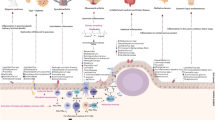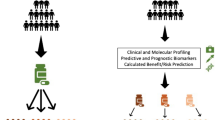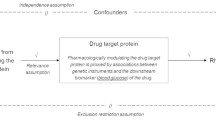Abstract
Objective
To quantitatively summarize the association of NFKBIA gene polymorphisms with autoimmune and inflammatory diseases.
Methods
We surveyed studies on the association of NFKBIA gene polymorphisms with autoimmune and inflammatory diseases in PubMed. Meta-analysis was performed in a fixed/random effect model.
Results
We identified 14 studies using a PubMed search. Meta-analysis was performed for NFKBIA gene polymorphisms at positions 2758 (A/G, 5 studies), −881 (A/G, 3 studies), −826 (C/T, 3 studies), and −297 (C/T, 3 studies). We did not detect associations of NFKBIA gene polymorphisms at positions 2758, −881, −297 with autoimmune and inflammatory diseases. An association of NFKBIA gene −826C/T polymorphism with autoimmune and inflammatory diseases was found (C vs. T: OR = 1.81, 95% CI = 0.97–3.36, P = 0.06; CT + TT vs. CC: OR = 2.11, 95% CI = 1.07–4.19, P = 0.03; TT vs. CC + CT: OR = 2.20, 95% CI = 0.78–6.21, P = 0.06; TT vs. CC: OR = 2.87, 95% CI = 0.78–10.62, P = 0.11; CT vs. CC: OR = 2.02, 95% CI = 1.22–3.36, P = 0.006).
Conclusion
This meta-analysis demonstrates that autoimmune and inflammatory diseases are associated with NFKBIA gene −826C/T polymorphism, but not with 2758A/G, −881A/G, and −279C/T.



Similar content being viewed by others
References
Tait KF, Marshall T, Berman J, Carr-Smith J, Rowe B, Todd JA, et al. Clustering of autoimmune disease in parents of siblings from the Type 1 diabetes Warren repository. Diabet Med. 2004;21:358–62.
Becker KG. Comparative genetics of type 1 diabetes and autoimmune disease: common loci, common pathways? Diabetes. 1999;48:1353–8.
Becker KG. The common variants/multiple disease hypothesis of common complex genetic disorders. Med Hypotheses. 2004;62:309–17.
Barnes PJ, Karin M. Nuclear factor-kappaB: a pivotal transcription factor in chronic inflammatory diseases. N Engl J Med. 1997;336:1066–71.
Baeuerle PA. Pro-inflammatory signaling: last pieces in the NFkappaB puzzle? Curr Biol. 1998;8:R19–22.
Tak PP, Firestein GS. NF-kappaB: a key role in inflammatory diseases. J Clin Invest. 2001;107:7–11.
Castro-Alcaraz S, Miskolci V, Kalasapudi B, Davidson D, Vancurova I. NF-kappa B regulation in human neutrophils by nuclear I kappa B alpha: correlation to apoptosis. J Immunol. 2002;169:3947–53.
Schreiber S, Nikolaus S, Hampe J. Activation of nuclear factor kappa B inflammatory bowel disease. Gut. 1998;42:477–84.
Rogler G, Brand K, Vogl D, Page S, Hofmeister R, Andus T, et al. Nuclear factor kappaB is activated in macrophages and epithelial cells of inflamed intestinal mucosa. Gastroenterology. 1998;115:357–69.
Neurath MF, Fuss I, Schürmann G, Pettersson S, Arnold K, Müller-Lobeck H, et al. Cytokine gene transcription by NF-kappa B family members in patients with inflammatory bowel disease. Ann N Y Acad Sci. 1998;859:149–59.
Neurath MF, Pettersson S. Predominant role of NF-kappa B p65 in the pathogenesis of chronic intestinal inflammation. Immunobiology. 1997;198:91–8.
Duerr RH, Barmada MM, Zhang L, Pfützer R, Weeks DE. High-density genome scan in Crohn disease shows confirmed linkage to chromosome 14q11–12. Am J Hum Genet. 2000;66:1857–62.
Sun XF, Zhang H. NFKB and NFKBI polymorphisms in relation to susceptibility of tumour and other diseases. Histol Histopathol. 2007;22:1387–98.
Szamosi T, Lakatos PL, Hungarian IBD Study Group, Szilvasi A, Lakatos L, Kovacs A, et al. The 3′UTR NFKBIA variant is associated with extensive colitis in Hungarian IBD patients. Dig Dis Sci. 2009;54:351–9.
Dieguez-Gonzalez R, Akar S, Calaza M, Perez-Pampin E, Costas J, Torres M, et al. Genetic variation in the nuclear factor kappaB pathway in relation to susceptibility to rheumatoid arthritis. Ann Rheum Dis. 2009;68:579–83.
Hong J, Leung E, Fraser AG, Merriman TR, Vishnu P, Krissansen GW. Polymorphisms in NFKBIA and ICAM-1 genes in New Zealand Caucasian Crohn’s disease patients. J Gastroenterol Hepatol. 2007;22:1666–70.
Katarina K, Daniela P, Peter N, Marianna R, Pavlina C, Stepanka P, et al. HLA, NFKB1 and NFKBIA gene polymorphism profile in autoimmune diabetes mellitus patients. Exp Clin Endocrinol Diabetes. 2007;115:124–9.
Leshinsky-Silver E, Karban A, Cohen S, Fridlander M, Davidowich O, Kimmel G, et al. Lack of association of the 3′-UTR polymorphism in the NFKBIA gene with Crohn’s disease in an Israeli cohort. Int J Colorectal Dis. 2007;22:1021–5.
Romzova M, Hohenadel D, Kolostova K, Pinterova D, Fojtikova M, Ruzickova S, et al. NFkappaB and its inhibitor IkappaB in relation to type 2 diabetes and its microvascular and atherosclerotic complications. Hum Immunol. 2006;67:706–13.
Butt C, Sun S, Peddle L, Greenwood C, Hamilton S, Gladman D, et al. Association of nuclear factor-kappaB in psoriatic arthritis. J Rheumatol. 2005;32:1742–4.
Klein W, Tromm A, Folwaczny C, Hagedorn M, Duerig N, Epplen JT, et al. A polymorphism of the NFKBIA gene is associated with Crohn’s disease patients lacking a predisposing allele of the CARD15 gene. Int J Colorectal Dis. 2004;19:153–6.
Abdallah A, Sato H, Grutters JC, Veeraraghavan S, Lympany PA, Ruven HJ, et al. Inhibitor kappa B-alpha (IkappaB-alpha) promoter polymorphisms in UK and Dutch sarcoidosis. Genes Immun. 2003;4:450–4.
Miterski B, Böhringer S, Klein W, Sindern E, Haupts M, Schimrigk S, et al. Inhibitors in the NFkappaB cascade comprise prime candidate genes predisposing to multiple sclerosis, especially in selected combinations. Genes Immun. 2002;3:211–9.
Hung YH, Ou TT, Lin CH, Li RN, Lin YC, Tsai WC, et al. IkBalpha promoter polymorphisms in patients with ankylosing spondylitis. Rheumatol Int. 2009;30:93–7.
Lin CH, Wang SC, Ou TT, Li RN, Tsai WC, Liu HW, et al. I kappa B alpha promoter polymorphisms in patients with systemic lupus erythematosus. J Clin Immunol. 2008;28:207–13.
Ou TT, Lin CH, Lin YC, Li RN, Tsai WC, Liu HW, et al. IkappaBalpha promoter polymorphisms in patients with primary Sjögren’s syndrome. J Clin Immunol. 2008;28:440–4.
Lin CH, Ou TT, Wu CC, Tsai WC, Liu HW, Yen JH. IkappaBalpha promoter polymorphisms in patients with rheumatoid arthritis. Int J Immunogenet. 2007;34:51–4.
Egger M, Davey SG, Schneider M, Minder C. Bias in meta-analysis detected by a simple, graphical test. Br Med J. 1997;315:629–34.
Cochran WG. The combination of estimates from different experiments. Biometrics. 1954;10:101–29.
Higgins JP, Thompson SG. Quantifying heterogeneity in a meta-analysis. Stat Med. 2002;21:1539–58.
Mantel N, Haenszel W. Statistical aspects of the analysis of data from retrospective studies of disease. J Natl Cancer Inst. 1959;22:719–48.
DerSimonian R, Laird N. Meta-analysis in clinical trials. Control Clin Trials. 1986;7:177–88.
Li Q, Verma IM. NF-kappaB regulation in the immune system. Nat Rev Immunol. 2002;2:725–34.
Uwe S. Anti-inflammatory interventions of NF-kappaB signaling: potential applications and risks. Biochem Pharmacol. 2008;75:1567–79.
Kuryłowicz A, Nauman J. The role of nuclear factor-kappaB in the development of autoimmune diseases: a link between genes and environment. Acta Biochim Pol. 2008;55:629–47.
Beinke S, Ley SC. Functions of NF-kappaB1 and NF-kappaB2 in immune cell biology. Biochem J. 2004;382:393–409.
Berenson JR, Ma HM, Vescio R. The role of nuclear factor-kappaB in the biology and treatment of multiple myeloma. Semin Oncol. 2001;28:626–33.
Bhoj VG, Chen ZJ. Ubiquitylation in innate and adaptive immunity. Nature. 2009;458:430–7.
Christman JW, Sadikot RT, Blackwell TS. The role of nuclear factor-kappa B in pulmonary diseases. Chest. 2000;117:1482–7.
Haddad JJ, Land SC. Amiloride blockades lipopolysaccharide-induced proinflammatory cytokine biosynthesis in an IkappaB-alpha/NF-kappaB-dependent mechanism. Evidence for the amplification of an antiinflammatory pathway in the alveolar epithelium. Am J Respir Cell Mol Biol. 2002;26:114–26.
Yoo CG, Lee S, Lee CT, Kim YW, Han SK, Shim YS. Anti-inflammatory effect of heat shock protein induction is related to stabilization of I kappa B alpha through preventing I kappa B kinase activation in respiratory epithelial cells. J Immunol. 2000;164:5416–23.
Haddad JJ, Land SC, Tarnow-Mordi WO, Zembala M, Kowalczyk D, Lauterbach R. Immunopharmacological potential of selective phosphodiesterase inhibition. II. Evidence for the involvement of an inhibitory-kappaB/nuclear factor-kappaB-sensitive pathway in alveolar epithelial cells. J Pharmacol Exp Ther. 2002;300:567–76.
Whiteside ST, Israël A. I kappa B proteins: structure, function and regulation. Semin Cancer Biol. 1997;8:75–82.
Okafuji I, Nishikomori R, Kanazawa N, Kambe N, Fujisawa A, Yamazaki S, et al. Role of the NOD2 genotype in the clinical phenotype of Blau syndrome and early-onset sarcoidosis. Arthritis Rheum. 2009;60:242–50.
He Y, Zhang H, Yin J, Xie J, Tan X, Liu S, et al. IkappaBalpha gene promoter polymorphisms are associated with hepatocarcinogenesis in patients infected with hepatitis B virus genotype C. Carcinogenesis. 2009;30:1916–22.
Acknowledgements
We thank all those who assisted with this study. We especially acknowledge the kind help of Dr. E. Leshinsky-Silver and Dr. JT Epplen. This work was supported by grants from the National Natural Science Foundation of China (30972530).
Author information
Authors and Affiliations
Corresponding author
Additional information
Responsible Editor: John Di Battista.
Rights and permissions
About this article
Cite this article
Zhang, GL., Zou, YF., Feng, XL. et al. Association of the NFKBIA gene polymorphisms with susceptibility to autoimmune and inflammatory diseases: a meta-analysis. Inflamm. Res. 60, 11–18 (2011). https://doi.org/10.1007/s00011-010-0216-2
Received:
Revised:
Accepted:
Published:
Issue Date:
DOI: https://doi.org/10.1007/s00011-010-0216-2




